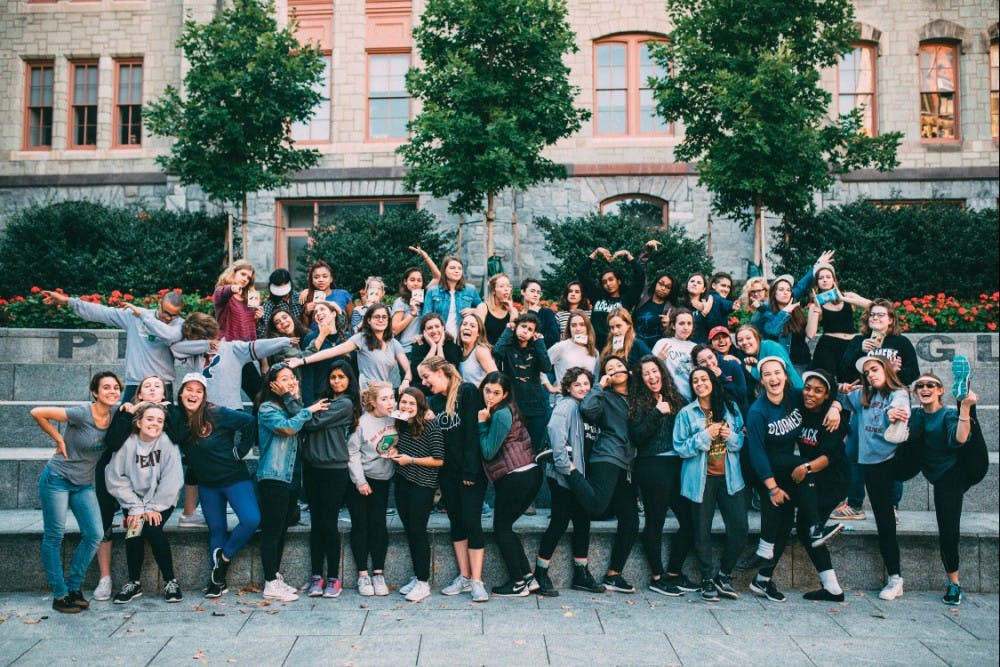
Mask and Wig's official policy for the all-male comedy troupe is to include and accept all “male-identifying” students in any part of the group, according to College seniors Zeeshan Mallick and Ethan Fein. Pictured here is an all women musical sketch comedy troupe, Bloomers. | Photo from Bloomers
Audition season has arrived for most performing arts groups at Penn, and students need to start deciding which groups to join.
The Performing Arts Council consists of over 46 student-run groups that are each required to be distinct in some way from all other groups in PAC. For this reason, groups often play up their unique qualities, which can include cultural or social features when advertising to students on campus.
For most students, this is a simple choice based on preference. But for gender non-conforming students, the choice to audition for single-gender groups can often be more complicated. Some single-gender performing arts groups are working to change this.
College senior Nadia Uberoi, who serves as the president for Penn's all-female pop a capella group Quaker Notes, said she hopes to take Quaker Notes in a more progressive direction.
“In light of recent cultural changes, it’s something we’ve been thinking about more,” Uberoi said.
Although Quaker Notes does not have an established policy on recruitment as of now, Uberoi said Quaker Notes is accepting all who identify as women.
As a student who identifies as genderqueer in an all-male music group, Penn Glee Club, College junior Nick Hunsicker said he had observed some of the difficulties posed by the ambiguity surrounding gender-based groups.
“It’s always interesting to think about my membership within the Glee Club because I do identify as gender non-conforming,” he said.
Hunsicker, who served on the board last year, said Glee Club does not have an official policy for recruiting gender non-conforming students, but that they work with non-male students interested in joining the tech staff, band or serving as the accompanist. Still, Hunsicker explained that there are "unspoken barriers" that sometimes prevent non-male members from being fully accepted.
“There’s not an acknowledgement of identity, which puts tension in how I perceive myself in the group.”
Much of the problem is rooted in the policy, Hunsicker said, because groups try to brand themselves distinctly in order to get funding from PAC.
“There needs to be institutional change within [Glee Club] and with a lot of organizations on campus that no one is willing to take up,” Hunsicker said. “Instead, they would rather let genderqueer people figure out where they fit.”
Hunsicker encouraged groups who want to be progressive in this matter to not “cut off an entire group of people based off of one facet of themselves.”
PAC does not have authority over the policies of its student-run organizations, but individual PAC groups have already started taking concrete steps within their mission statements or constitutions.
The all-women comedy troupe, Bloomers, added an addendum to its internal constitution in April 2017 that stated the group will accept "all women-identifying" students. Bloomers president and Engineering and Wharton senior Meghana Jayam reaffirmed this in front of the crowd gathered on the night of Sept. 1 for Bloomer's free show.
Jayam said now, the group is working on translating the policy shift into the group’s advertising.
“It’s important that you actively say people have a right to be in your group,” said College junior Becca Lambright, who is a musical director in Bloomers. “Otherwise they will assume that you don’t want them, which is unfair.”
Mask and Wig's official policy for the all-male comedy troupe is to include and accept all “male-identifying” students in any part of the group, according to College seniors Zeeshan Mallick and Ethan Fein, who serve on the Mask and Wig Executive Board.
The organization also wanted to make it known that they work with students on a case by case basis if any questions or concerns arise.
“I’m sad that it took so long,” Lambright said, reflecting on the Bloomer’s addendum. “I don’t think we’re done yet. I think there’s always more that we can push for.”
The Daily Pennsylvanian is an independent, student-run newspaper. Please consider making a donation to support the coverage that shapes the University. Your generosity ensures a future of strong journalism at Penn.
Donate




